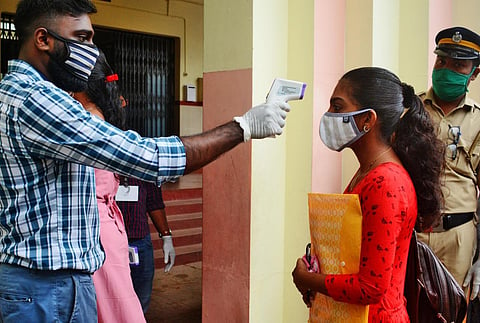

BENGALURU: Despite the clamour against the Karnataka CET examination 2020, the government has come out with protocols, to ensure that even COVID positive candidates are not denied a chance.
Students have to inform officials well in advance and get a physicians letter. While a 108 ambulance will transport these candidates between hospital and exam centre.
The health department's standard operating procedures which were released on Saturday stated that those tested positive with COVID will be given a special hall to write the CET exam.
Halls will be sanitised after the exam. Precautionary measures for staff handling such students have been informed about their protocols.
For those who come from containment zone, their halls should be cleaned with 1 per cent sodium hypochlorite within 30 minutes of their departure and the room can be used only after 24 hours, it added.
Students who are coming from other states and countries are relieved from the mandatory two weeks quarantine. A special exam hall has to be given to them and preventive measures have to be taken.
The health department has sought coordination of various levels of officials from the departments to enforce this under their respective deputy commissioner.
The examination remains scheduled for July 30 and 31. Students are expected to be present two hours in advance and are allowed to carry their tiffin boxes along.
Three feet distance is mandated in the exam hall, ensuring only two students per bench, and the strength of the hall should not exceed 24 students.
Students have to be informed about their seats arrangement well in advance, to avoid gathering at the notice board, noted the notification by the health department, that highlighted basic hygienic practices. All students are expected to wear a mask.
At Least one additional centre is to be identified in each district and kept as a backup. And in Bengaluru, four such centres should be reserved. In case a centre falls in the containment zone, the students will be shifted to the reserve centre after consultation with the DC.
50 surgical masks should be given to every exam centre, and are to be bought using the natural disaster management fund.
Students from containment areas will be kept in special rooms, given surgical masks and supervisors of the hall will be given gloves and surgical masks. The room should be chemically disinfected after the exam of the day.
Those officials and staff of the CET should be trained by the deputy commissioner, ZP CEO and Superintendent of Police and district health officer.
SOP
|